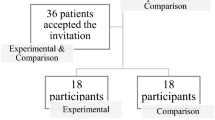Abstract
This study evaluated the effectiveness of a brief, group rational-emotive (RET) treatment and problem solving treatment for divorce related dysphoria, involving six hours of therapy over 22 days. A waiting list condition was used for comparison. On three measures of dysphoria, RET and Problem-Solving subjects improved significantly more than Waiting List subjects and RET and Problem-Solving subjects maintained their improvement at a one-month follow-up. There was no significant difference in improvement between RET and Problem-Solving treatments. Effectiveness of the treatments could have been due either to specific content, group therapy components, or nonspecific effects.
Similar content being viewed by others
References
Beck, A.T., Ward, C.H., Mendelson, M., Mock, J.E., & Erbaugh, J.K. (1961). Assessment inventory for measuring depression.Archives of General Psychiatry, 4, 561–571.
Bloom, B.L., Asher, S.J., & White, S.W. (1978). Marital disruption as a stressor: A review and analysis.Psychological Bulletin, 85, 867–894.
Bloom, B.L. Hodges, W.F., & Caldwell, R.A. (1982). A preventive program for the newly separated: An initial evaluation.American Journal of Community Psychology, 10, 251–264.
Briscoe, W., Smith, J.B., Robins, E., Morten, S. Gaskin, F. (1973). Divorce and psychiatric disease.Archives of General Psychiatry, 29, 119–125.
Dasteel, J.C. (1982). Stress reactions to marital dissolution as experienced by adults attending courses on divorce.Journal of Divorce, 5, 37–47.
D'Zurilla, T.J. & Goldfried, M.R. (1971). Problem solving and behavior modification.Journal of Abnormal Psychology, 82, 10–16.
Ellis, A. (1962).Reason and emotion in psychotherapy. New York: Citadel.
Goode, W.J. (1956).After divorce. Glencove, IL: Free Press.
Hackney, G.R., & Ribordy, S.C. (1980). An empirical investigation of emotional reactions to divorce.Journal of Clinical Psychology, 36, 105–110.
Hamberger, K., & Lohr, J.M. (1980). Rational restructuring for anger control: A quasi-experimental case study.Cognitive Therapy and Research, 4, 99–102.
Hetherington, M. (1972). Effects of father absence on personality development in adolescent daughters.Developmental Psychology, 7, 313–326.
Kessler, S. (1978). Building skills in divorce adjustment groups.Journal of Divorce, 2, 209–216.
Langelier, R., & Deckert, P. (1980). Divorce counseling guidelines for the late divorced female.Journal of Divorce, 3, 403–411.
LaPoint, K.A., & Rimm, D.C. (1980). Cognitive, assertive, and insight-oriented group therapies in the treatment of reactive depression in women.Psychotherapy: Therapy, Research and Practice, 17, 312–320.
Mahery, D.C., & Myrick, R.D. (1981). A community seminar: Coping with divorce/separation.Personnel and Guidance Journal, February, 398–401.
Malouff, J.M. (1984). Development and validation of a behavioral peer-rating measure of depression.Journal of Consulting and Clinical Psychology, 52, 1108–1109.
Mayer, J.M. (1978). Assessment of depression. In P.M. Reynolds (Ed.),Advances in Psychological Assessment (Vol. 4). San Francisco: Jossey Bass.
McNair, D.M., Lorr, M., & Droppleman, L.F. (1971).Manual for Profile of Mood States. San Diego: Educational and Industrial Testing Service.
Nietzel, M.T., Russel, R.L., Hemmings, K.A., & Gretter, M.L. (1987). Clinical significance of psychotherapy for unipolar depression: A meta-analytic approach to social comparison.Journal of Consulting Psychology, 55, 156–161.
Paykel, E.S. (1973). Life events and acute depression. In J.P. Scott, & E.G. Senay (Eds.),Separation and Divorce. Washington, D.C.: American Association for the Advancement of Science.
Pearlin, L.I., & Johnson, J.S. (1977). Marital status, life strains and depression.American Sociological Review, 41, 704–715.
Radloff, L. (1975). Sex differences in depression: The effects of occupation and marital status.Sex Roles, 1, 249–264.
Seagraves, R.T. (1980). Marriage and mental health.Journal of Sex and Marital Therapy, 6, 187–198.
Shaw, B.F. (1977). Comparison of cognitive therapy and behavior therapy in the treatment of depression.Journal of Consulting and Clinical Psychology, 45, 543–551.
Taylor, F.G., & Marshall, W.L. (1977). Experimental analysis of a cognitivebehavioral therapy for depression.Cognitive Therapy and Research, 1, 59–72.
Thiessen, J.D., Avery, A.W., & Joanning, H. (1981). Facilitating post-divorce adjustment among women: A communications skills training approach.Journal of Divorce, 4, 35–44.
Vaughan, F.K. (1981). A model of divorce adjustment therapy.Family Therapy, 8, 121–128.
Welch, G.J., & Granvold, D.K. (1977). Seminars for separated/divorced: An educational approach to postdivorce adjustment.Journal of Sex and Marital Therapy, 3, 31–39.
Wilson, P.H., Goldin, J.C., & Charbonneau-Powis, M. (1983). Comparative efficacy of behavioral and cognitive treatments of depression.Cognitive Therapy and Research, 7, 111–124.
Author information
Authors and Affiliations
Additional information
John Malouff is a clinical psychologist with the Rehabilitation Center of Palm Beach, Florida. Richard Lanyon is a professor in the Psychology Department at Arizona State University in Tempe. Nicola Schutte is an assistant professor of psychology at Nova University in Ft. Lauderdale, Florida. The authors wish to acknowledge the many contributions of Kris Cooper, Wendy Ramerth and Denise Gehrling to the study.
Rights and permissions
About this article
Cite this article
Malouff, J.M., Lanyon, R.I. & Schutte, N.S. Effectiveness of a brief group RET treatment for divorce-related dysphoria. J Rational-Emot Cognitive-Behav Ther 6, 162–171 (1988). https://doi.org/10.1007/BF01064077
Issue Date:
DOI: https://doi.org/10.1007/BF01064077




